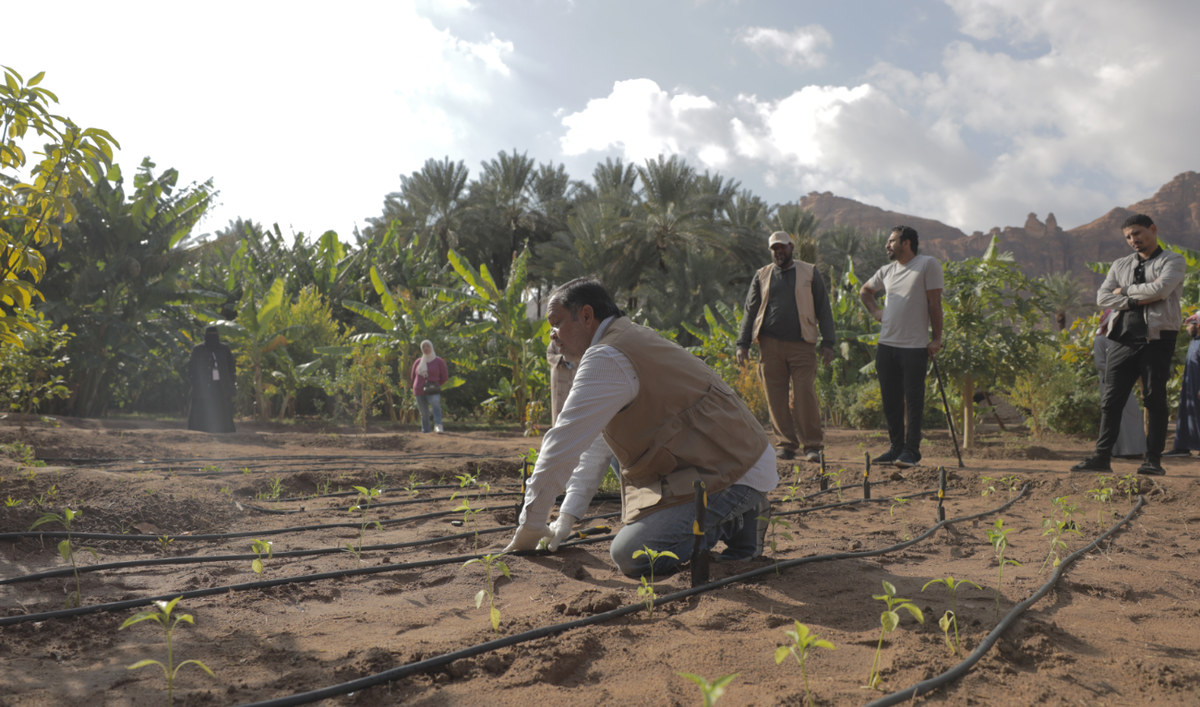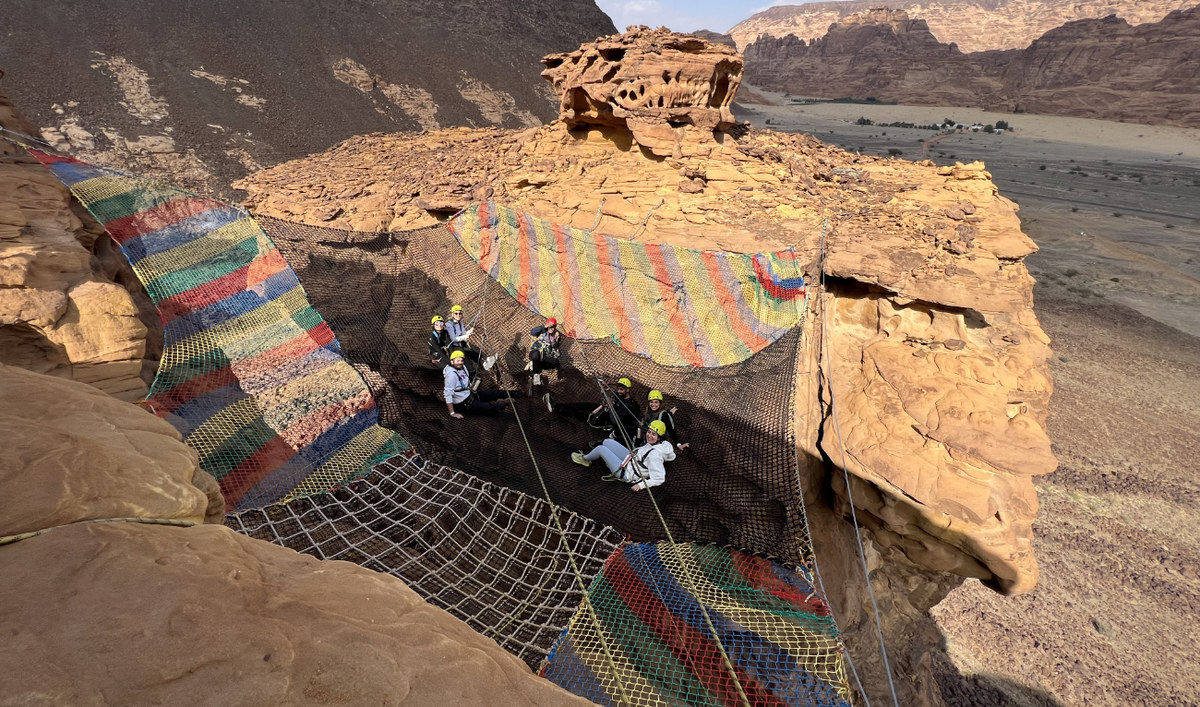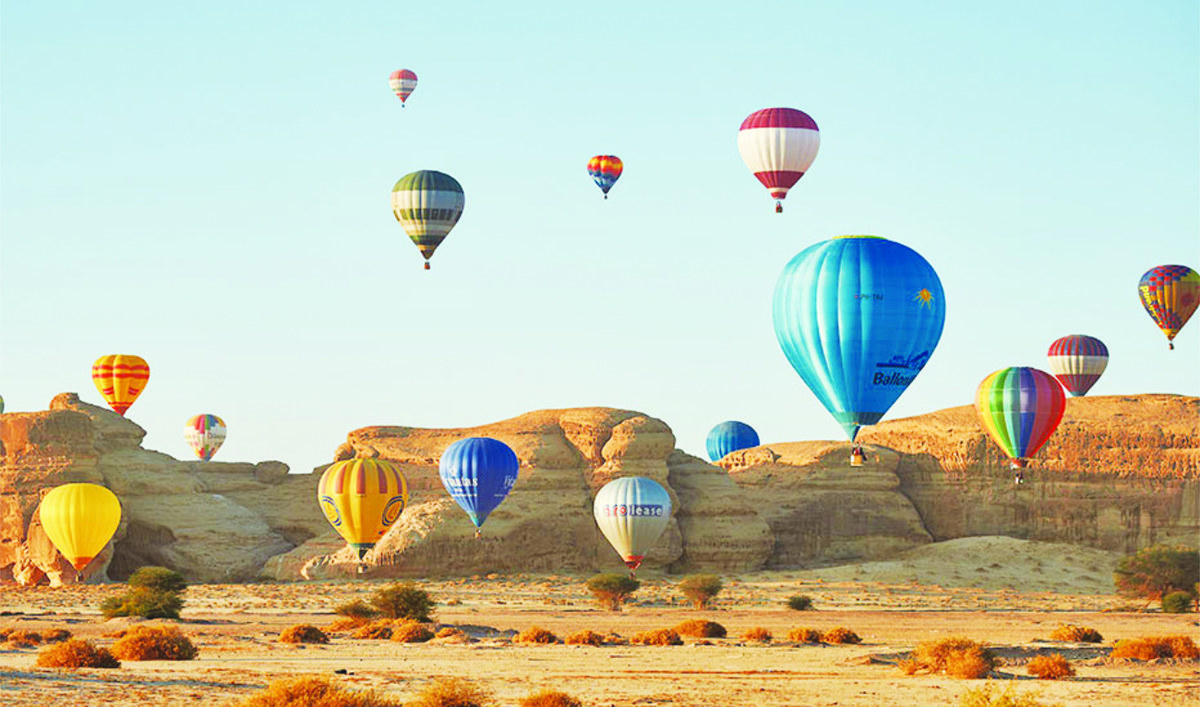ALULA: With the Winter at Tantora Festival underway, Experience AlUla is enticing new visitors from around the globe by highlighting the oasis city’s natural wonders and attractions.
Ecotourism gets a boost as visitors to the heritage oasis explore local crops and learn more about AlUla’s eco-gardening, an environmentally friendly farming system. The experience is enhanced by local guides who explain the history of the oasis and its water resources.
The eco-farms benefit from a combination of local and scientific knowledge, as well as environmental and social approaches that have been successfully applied to agricultural systems in similar areas.
During a visitors’ tour, Badr Al-Mutairi, a Saudi agricultural consultant, told Arab News: “This oasis is a case study and a model to be followed by the rest of AlUla’s oasis. It embodies the best eco-farming practices for local farmers so they understand the concept, the engineering, the ideal design of the oasis and what serves it best.”
Al-Mutairi is also a certified inspector with four different standards in organic agriculture, including the Saudi Organic Standard, the American law NOP, and the European and the Japanese Agricultural Standards.
He said that crops were grown in the AlUla organic oasis according to well-studied agricultural arrangement, beginning with a dam represented by date palm trees of equal height, followed by banana and citrus trees, and then smaller crops, such as leafy greens.
“All the crops grown in the oasis represent an integrated environmental system. Once the dry air stream enters between the palm trees, the air will be gradually conditioned. This creates moist air that the banana trees benefit from. As a result, more humid air will be produced in an area protected by the shades of banana trees facilitating the growth of citrus trees. After passing through these conditions, sunlight and more moderate air will be perfect for the weaker crops.”

(AN Photo: Abdullah Jaber)
Agroecology in AlUla integrates environmental science principles with indigenous knowledge and practices. It effectively combines scientific investigation by researchers and farmers with community experiments using formal and informal methods.
“There was a part of the oasis that was repaired by an old farmer who lived in the oasis. We tried to complete those reforms according to advanced scientific methods. We took advantage of agriculture and animal husbandry in compost making, which arises from the recycling of agricultural and animal waste,” Al-Mutairi said.
The sustainable agricultural system is based on the good utilization of all components of the farm. In practice, this is done by preparing the middle area of the farm to produce organic fertilizer of high quality by mixing farm waste and animal waste through aerobic fermentation.
“The output of this process is returned to the land in quantities according to the type of soil. Usually two tons per 1,000 square meters are used to improve its fertility and support its microbiological life,” Al-Mutairi said.
The tour of the oasis also offers visitors sessions that provide an immersive learning experience, with the chance to explore the gardens and observe the animals that are traditionally found on farms, including peacocks, turkeys, chicken, sheep, rabbits and goats.
The entrance of the oasis features breathtaking scenery, with date palms spreading as far as the eyes can see. Guests are welcome to walk around and take photographs.
One visitor, Salma Al-Hariri, 24, from Riyadh, said: “The minute I entered the oasis I was trying to comprehend the beauty. The nature is enchanting.”
She said that palm swings and planting were her favorite part of the experience.
Visitors can also enjoy interactive three-hour micro-ecosystem workshops that focus on vegetable gardening, plant nurseries and composting.
Nafea Abdulhameed Al-Tumbakti, an expert in ecological farming from the Royal Commission for AlUla, told Arab News: “The AlUla oasis covers an area of about 350 hectares. It has been rehabilitated through certain steps, the most important of which was the recycling of agricultural waste that existed in the past through the production of organic fertilizers and the re-fertilization of the soil.”
AlUla’s fertile agricultural land is suitable for various crops across the seasons, especially citrus fruits and dates. AlUla is famously home to about 2.3 million palm trees that extend its oasis. According to Al-Mutairi, Barni is considered to be one of the most popular commercial palm varieties in the region. It produces a medium-sized date with a firm, long body and rustic texture.
Al-Tumbakti also discussed the winter crops of AlUla. “Leafy crops are in season now. Cauliflower, cabbage, broccoli and oranges are all harvested on time and displayed in the fresh market.”
The Fresh Food Market of the winter season is set to begin on Jan. 27 and will continue for two months. It will feature outdoor stalls of fresh produce, an array of AlUla’s crops, such as pomegranates, oranges and other seasonal fruits and fresh vegetables, including eggplant, onions, peppers, lettuce and more. Regional dishes and a variety of sweets will be also on display so visitors get the chance to explore the traditional flavors of AlUla.
Up, up and away with a season of adventures in AlUla
The first weekend of the Winter at Tantora festival concluded with an adrenaline rush adventure at “Via Ferrata.” Brave visitors zigzagged through an immersive climbing experience, crossing the canyons of AlUla along a challenging route.

Once the route was completed, adventurers crossed a suspension bridge to the other side of the mountain. A see-through hammock is set up between two mountains for guests who would like to take in the special view of the valley.
Hot-air balloons that floated up to 6,000 feet in the air offered panoramic views of AlUla’s unique landscape.

In March 2022, AlUla Moments in association with the Saudi Arabian Hot Air Balloon Federation broke the record for the world’s largest hot-air balloon glow show with a display of 142 hot-air balloons. (Supplied)
AlUla Moments distributed flight certificates to visitors who ascended into the skies. Visitors can enjoy tethered and untethered experiences of 45-60 minutes, depending on weather conditions and availability.
In March 2022, AlUla Moments in association with the Saudi Arabian Hot Air Balloon Federation broke the record for the world’s largest hot-air balloon glow show with a display of 142 hot-air balloons. The event took place near Hegra, Saudi Arabia’s first UNESCO World Heritage Site.
The eco-gardening experience runs until the end of March. Visitors can enjoy AlUla experiences in pairs or groups, and tickets for all activities can be booked at experiencealula.com.














